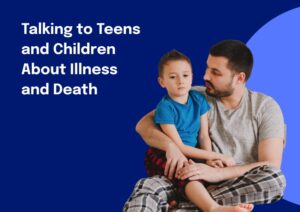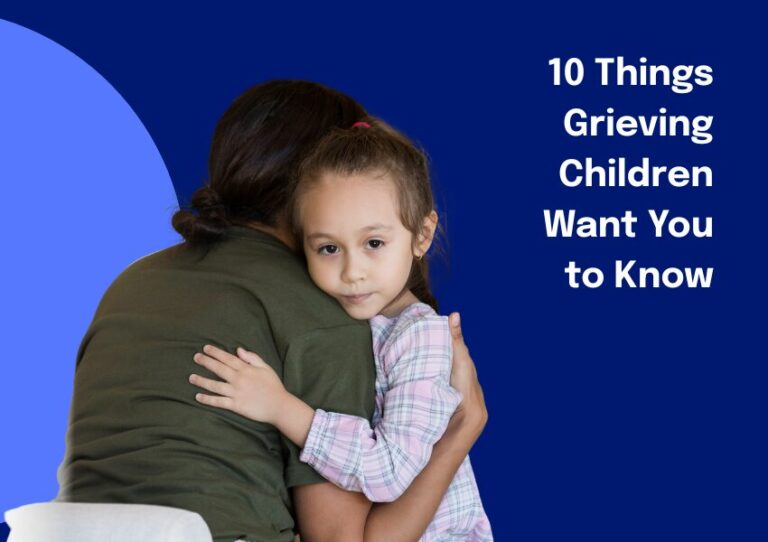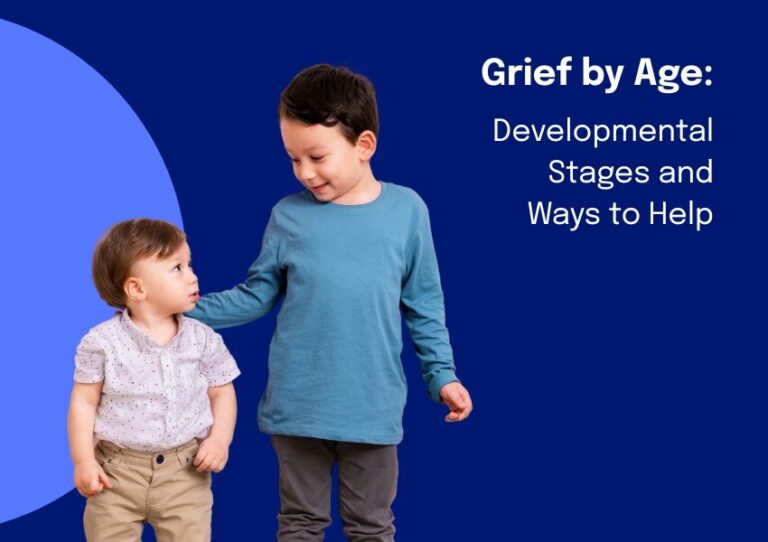Talking to Teens and Children About Illness and Death
 A child’s understanding
A child’s understanding
Helping a child deal with major life changes can be difficult. Children don’t have the experience to understand as adults do. However, as family members, each child should be included, at their level, in discussions and activities during the illness or death of a loved one.
Children’s emotional and intellectual development affects their understanding. Most children understand illness at some level and it’s important for them to know what is happening. We can help them by providing honest, age-appropriate information and listening to their responses.
Explaining how we feel can be helpful. Tell the child that it is normal to be sad when hearing the news about a loved one, and explain that adults around them may be upset and crying. This also may be a good time to talk about the family’s beliefs concerning afterlife.
Each age group requires a different approach when discussing illness or loss. See Developmental Grief Responses. Remember, each child is unique. One child may seem unfazed by the news, while another will show intense emotions. Whatever their reactions, children need to understand the situation if they are to successfully grieve and cope with the loss of a loved one. You can help by beginning the conversation.
Beginning the conversation
Depending on attention span, your conversation may be brief, but it should not be interrupted. So, find a time that you can turn off the television or any other distractions.
Explain the importance of what you want to say. “I want to talk with you about something very important,” is a good introduction to the conversation. Be truthful, honest and do not avoid sharing the difficult part of the situation, trying to spare the child natural sadness or pain. This only confuses children and makes the situation even more of a mystery.
Keep in mind that younger children can’t stay focused on in-depth talks. Don’t be disappointed if, after working up the courage to talk, your preschooler asks what’s for dinner a minute after you’ve begun your conversation. Older children may not have much to say either. Give them time to come back later with questions or thoughts when they are ready.
It may be helpful to ask children what they think will happen to their loved one. You can explain the illness, its possible progression and the possibility that the child’s loved one may die. Give enough information for the child to understand how serious it is.
Ask children if there is anything they want to say to or do for their loved one. Children often have incredible ideas that can make this time very special.
Addressing children’s fears
Young children who have experienced the illness, ICU care, or death of a loved one often worry that they will also get sick or that their caregiver will. Children of all ages also worry about what will happen to them during the illness or after the death of their loved one. Children need the security of knowing an adult will care for them. Assure them you plan to be there for them and that they won’t be left completely alone.
Emphasize that their loved one’s illness is not their fault. Use clear, direct explanations of what happened so younger children won’t assume their actions or thoughts caused the loved one’s illness or death.
Including children and teens during illness
Let them visit, even help you care for their loved one. Including children can help prevent fears about future, similar experiences. Understanding grows from seeing, doing and taking part in the care. Let them know how they can be most helpful during the illness. For example, by spending time with their loved one or sending notes, homemade pictures or other expressions of love, they can have a part in providing care.
For a sudden illness or death
Because there is no time to prepare or say goodbye, young people may have more difficulty with a sudden illness. Their questions and feelings will begin when you give them the news. Use basic information as you explain what has happened – it is not necessary to include every detail to give them an accurate picture.
Let them know their feelings are okay and normal. Include them in the visitation and funeral if they are comfortable with attending. Reassure them they will be cared for and let them know that any questions or concerns they have are important to the adults around them.
If they did not have a chance before the death to tell the person who died how they felt about them, encourage children to write a letter to the person saying all they wanted to say. The letter may be left in the casket or on the grave. It is helpful for each of us, including children, to express our thoughts and feelings, and it is not too late to do that during or after the funeral.
When a child asks questions
The child probably will have questions. Answer only what the child is asking. Do not criticize the questions, no matter how simple or unusual they may seem. Be sure the child knows he or she is not at fault. Listen closely to the child and make sure there is an adult available to answer future questions at any time. This might be the time to teach a child what it means to physically die. Explain that the heart stops, the person stops breathing and that he or she can no longer talk or feel. Do not describe death as being like sleep. This may cause the child to develop a fear of sleeping.
Answer as best you can when children ask “why?” No one has all the answers, and an “I don’t know” might be the best and most honest response. Many adults find that explaining their religious beliefs is helpful. Including a local minister, priest, rabbi, imam, or other member of clergy in the discussion might be helpful.
The concept of illness or death is often difficult for children to grasp and it changes lives forever in both adults and children. Know that such an event may have a lifelong impact and may be an ongoing issue to address as time passes. How quickly healing occurs is very personal. However, children have the ability to bounce back and often find comfort in knowing the truth. Providing the tools to cope allows children to move forward as vital members of a recovering family. Take the time to equip yourself so that the emotional road ahead may be as smooth as possible for the children involved.
Preparing for a funeral or memorial service
Give a detailed explanation of what happens before and during a funeral. Deciding whether a young person will attend a funeral will depend on age, the individual family and the young person’s desires. Be sensitive to reactions in discussing the funeral. There may be fear, even panic in anticipating the event. Some families allow the child or teen to decide whether to attend. If they do not attend, plan carefully who will be with them during the funeral. Later, discuss the funeral with them and bring them back into the family circle after the funeral.
For children who have never attended a funeral, describe what happens so that they can understand. Talk about what will happen at the funeral, what the funeral home will look like and how people will behave. Ask if there are any questions and answers those questions calmly and accurately. Before the funeral or visitation, arrange for an adult —someone who is not emotionally involved with the death —to be available to take charge of the child if he or she decides not to attend at the last minute. They may have more questions or need to take a break. Some children cannot last through an entire visitation or funeral.
Ideas for including young people in funeral planning
There are many ways to include the whole family in planning the funeral and making it meaningful:
- Memory Table – have them gather things to remind them of the person, something the person loved, something with sentimental value. Bring these to the funeral home to place on a memory table with labels that explain the significance.
- Collage – make a picture collage of the loved one and the family. Use photos, magazine pictures or other items to represent their life.
- Letter, Memories in the Casket – place notes, letters and sentimental items in the casket. (Note: if children place a toy or stuffed animal, make sure they know that it will be buried and they will not get it back.)
- Sense Memories – think of what the person was known for. In memories of the person, what do you see, hear, smell or taste when you think of them? Use those memories as a way to participate in the funeral. Example: Uncle Joe always had cinnamon candy, so let children pass out his favorite candy to those attending the funeral.
- Music – be creative and pick what is meaningful to your family. Let the children help you decide. Some young people may wish to sing or play an instrument.
- Written Memories – have children draw a special border design on paper and have it photocopied. Then let them hand it out at the funeral for people to write memories or messages to the deceased. These can be given to the family or placed in the casket.
- List of Favorite Things – ask young people to list favorite things about the person who died or write a poem, letter, note or memory to read at the service or have an adult read.
Memorial activities at Graveside:
- Decorating the Grave – flowers, symbolic objects, notes and messages.
- Remembering at the Grave – reading and storytelling. Making a family circle.
- For Later Visits – placing stones, changing decorations.
- Special Day Visits – birthdays, anniversaries, anniversary of death.
Letting go activities:
- Bubbles—Use to blow away difficult feelings. Can symbolize messages of love and caring
- Butterflies—Release to fly free.
- Fire—Lighting and blowing out candles. Burning messages to let go of difficult feelings.
- Incense—Choose a scent to symbolize messages or feeling. (Please do not release balloons due to impact on wildlife)
En Español: Hablar con los Niños y Niñas sobre la Enfermedad y la Muerte



